Israel at War: What happened on Day 62?
Israel reportedly preparing to flood the Hamas tunnel network in Gaza • US Navy shoots down drone from Houthi-controlled Yemen
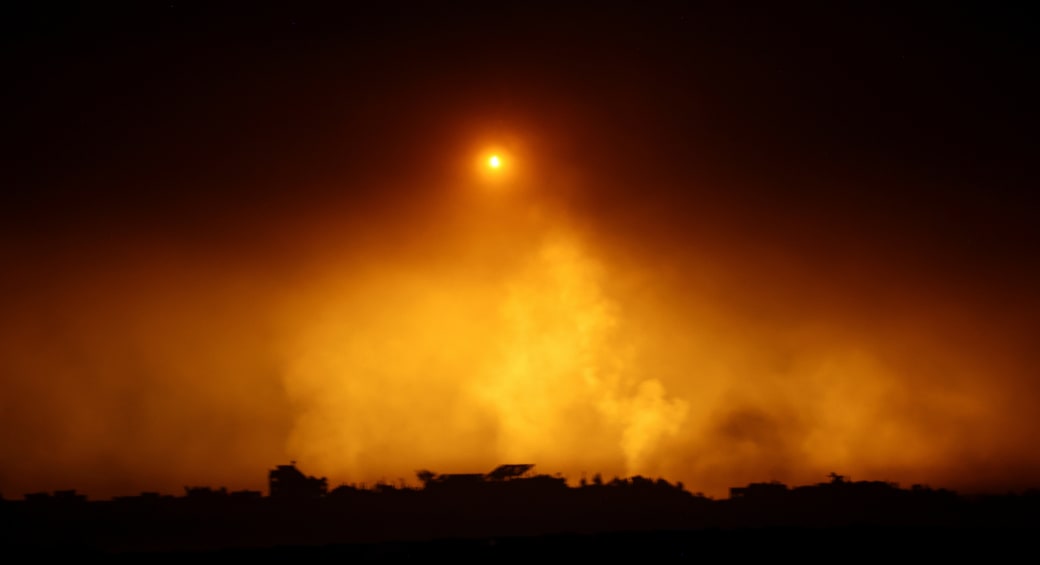

Israel's Knesset unites in mourning for minister Eisenkot's fallen son
"We are crying with you, and we are embracing you," Prime Minister Benjamin Netanyahu said.
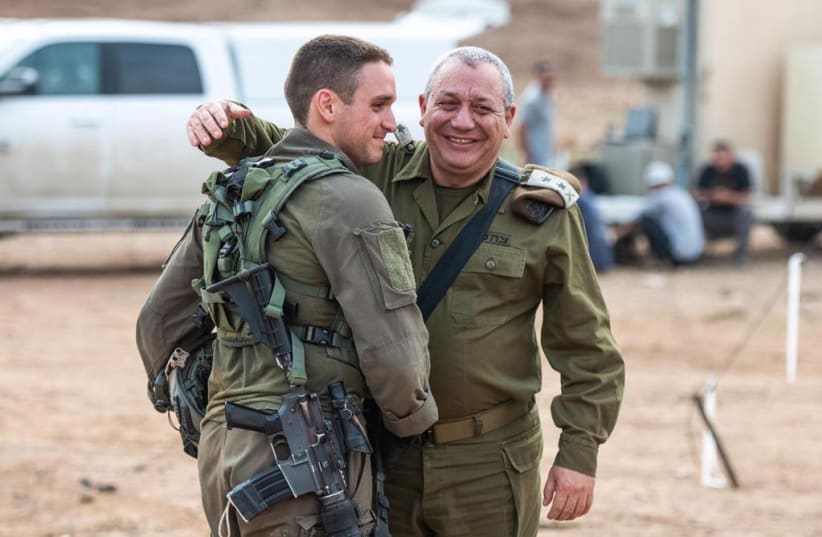
Israel's Knesset rallied in support of Minister Gadi Eisenkot from National Unity after his son Gal was killed in action in Gaza on Thursday.
National Unity leader Minister Benny Gantz sent his condolences to Eisenkot and his family, saying that everyone was committed to continue fighting for the cause for which Gal had died.
Go to the full article >>'We are all Israelis': Arab sector leaders watch October 7 horror film
In attendance were heads of local municipal authorities, community leaders, media personalities, journalists, and thought leaders from the Arab community in Israel.
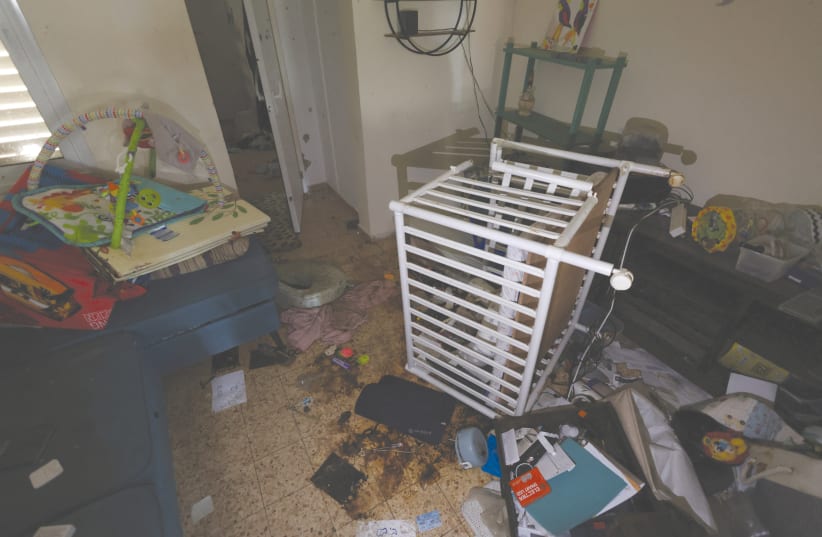
The IDF Spokesperson's Unit held a screening on Tuesday night for leaders of the Israeli-Arab sector, showing them the video testimony of the horrific events of October 7.
In attendance were heads of local municipal authorities, community leaders, media personalities, journalists, and thought leaders from the Arab community in Israel.
The screening took place in Nazareth and was also attended by Diaspora Affairs and Combatting Antisemitism and Social Equality Minister Amichai Chikli.
The film, according to Chikli, reveals the degree to which "education can lead to murderous hatred, to the point of erasing the essence of God in a person, even if he shouts [God's] name while slaughtering women and children."
Arabs and Jews going through this together
"Today is the second time I watched the film," said Maher Khaliliya, head of the municipal council of Yafia. "We support the victims of the massacre, Israelis who experienced inhuman acts by Hamas. It is important to me that we convey the message that we, the Arabs and the Jews...are going through this period together."
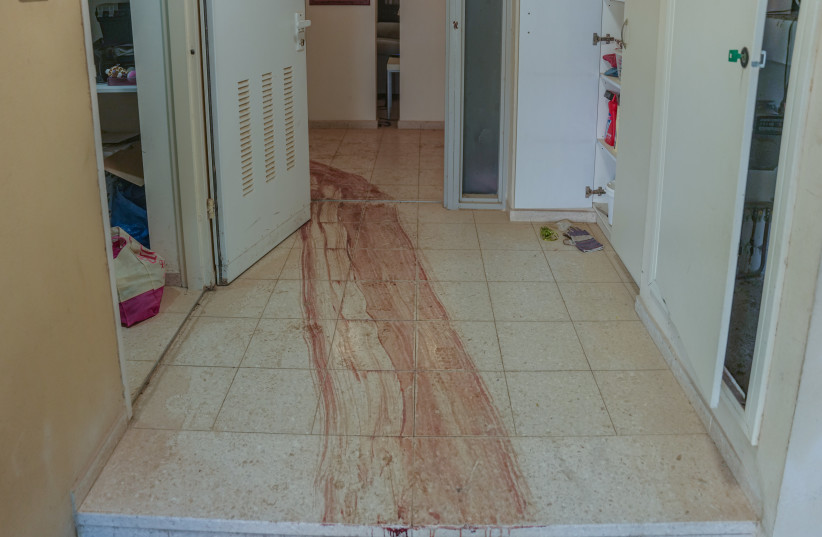
"I strongly condemn the terrorist acts of Hamas," continued Khaliliya. "What we saw in the movie is...not human behavior. It does not matter if we are Jews, Muslims, Christians, or Druze - the main thing is that we know how to remain human."
"It was important for me to see the film again and express a deep sympathy for the victims," he added.
Khaliliya continued, saying: "As a person living in Israeli society, I [share] deep pain with the citizens who received this blow on that Saturday, on their holiday, on their [day of] rest. Every father and every mother just wants to protect their children - and when they come in to murder you and your children and commit terrorist acts inside your home, it's simply the end of the world.
"We will continue to live together and take care of each other. We are one society...We need to continue to live together - Jews alongside Arabs. We are all Israelis."
Go to the full article >>IDF drops Gaza leaflets citing Quran, warns of punishment for 'wrongdoers'
The leaflets were linked by some to reports the IDF intends to flood the Hamas tunnels under Gaza.
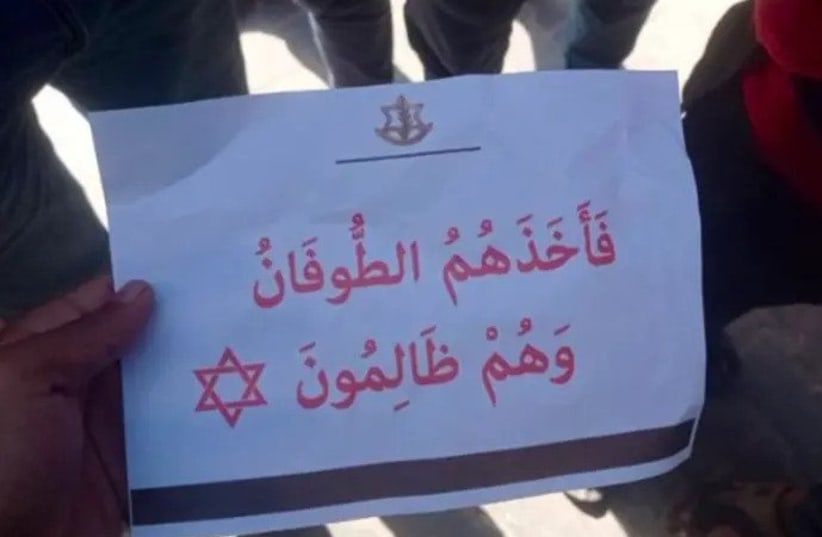
The IDF dropped leaflets over Khan Yunis in the southern Gaza Strip on Wednesday citing a Quranic verse about how the wicked in the times of Noah were swept away by the biblical flood, according to Palestinian reports.
"Then the Flood overtook them, while they persisted in wrongdoing," read the leaflets which also included a Star of David and the emblem of the IDF.
The quote is taken from verse 14 in Surah Al-'Ankabut (the Spider), the 29th chapter of the Quran.
Leaflets linked to reports IDF intends to flood Hamas tunnels
The leaflets were linked by some social media users to reports that the IDF intends to flood the tunnels under Gaza in an attempt to force Hamas aboveground. The leaflets were also dropped as rainy weather hit the area.
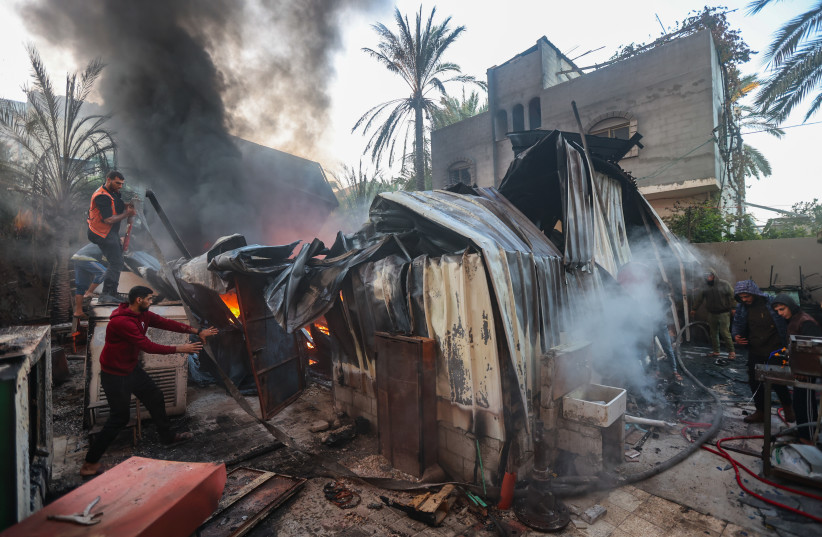
The IDF has dropped leaflets throughout Gaza since the beginning of the war with instructions to civilians for evacuation and other directives.
The latest leaflets came as the IDF surrounded Khan Yunis, believed to be the city where Hamas leader Yahya Sinwar and other senior Hamas members are hiding.
Go to the full article >>Israeli teen speaks of Hamas captivity with her dog in Gaza
Mia and her mother Gabriela were visiting family in Kibbutz Nir Yitzhak when they were taken hostage by Hamas during its October 7 attack on southern Israel, sparking the war in Gaza.
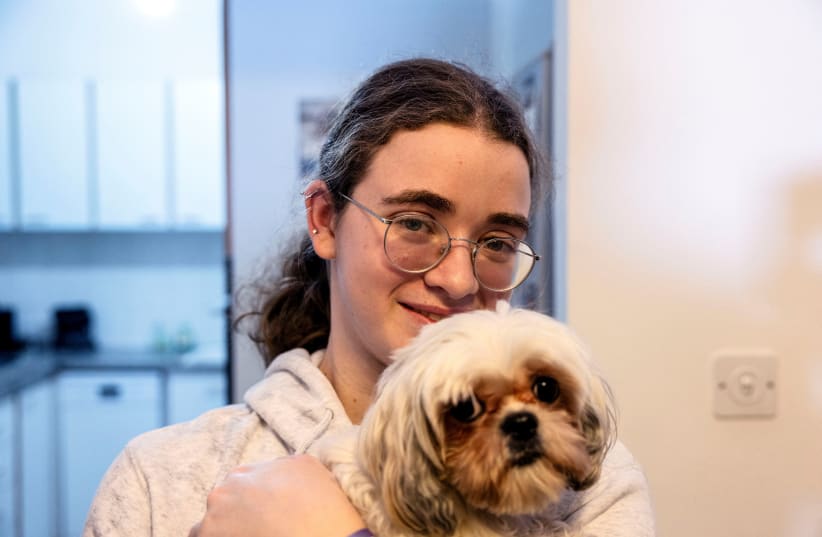
Mia Leimberg emerged from nearly two months' captivity in Gaza with Bella, her Shih Tzu, in her arms, one of the most astonishing moments of a week-long ceasefire between Israel and Hamas that ended last Friday.
"When we were there we had to feed her our leftovers - yeah I'm talking about you Bella," said Mia, 17, looking down at the small white dog in her arms. "And we had to make sure that she doesn't run wild where we were. We had to keep her so that she doesn't go exploring and annoy anybody there."
Mia and her mother Gabriela were visiting family in Kibbutz Nir Yitzhak when they were taken hostage by Hamas during its October 7 attack on southern Israel, sparking the war in Gaza.
The mother, daughter, aunt, and dog were set free as part of a swap for Palestinian prisoners, but her uncle and her aunt's partner remain in captivity.
"It was difficult. I held her (Bella) all the way there. It was an extra four kilos. And I'm just lucky enough that I managed to keep her through that whole situation and bring her back," Mia said from her home in Jerusalem in her first media interview.
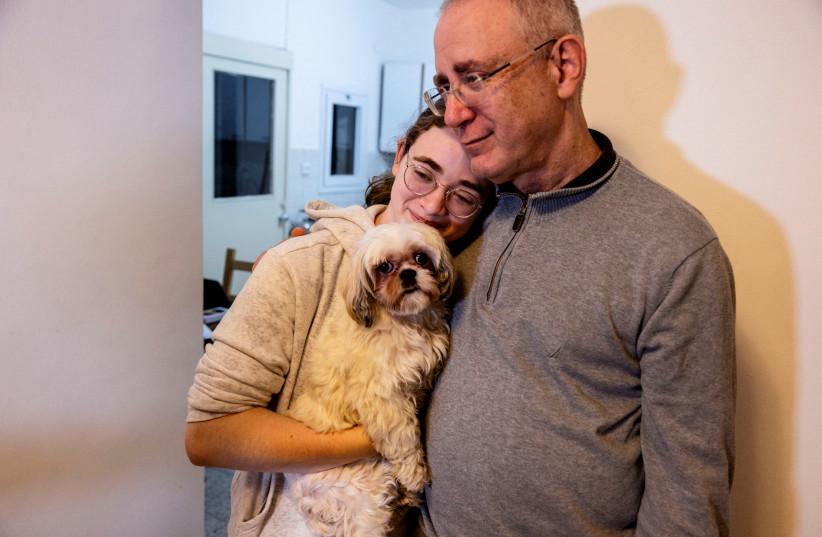
Descriptions of Hamas captivity have started to emerge with the return home of some of the Israeli hostages. Some have described 'suffocating' quarters, with no access to medication and dwindling food. Children have recounted being ordered always to keep quiet.
"Luckily for me Bella is unlike all the other small dogs that I personally know, she is rather quiet, unless when she is playing or mad," she said. "If they would have seen her as a bother I think they would not have let me keep her, in all honesty."
'She was a huge help to me'
Many pets were killed or went missing during Hamas's rampage.
Mia's father Moshe said they searched for Bella during the weeks of his family's captivity. On the day of their release, he was surprised to hear she came out holding the dog.
He described in more detail what his daughter went through to keep Bella. "She was worried that something would happen to the dog if she left her behind," he said.
Mia hid the dog under her pajamas as they were loaded into a vehicle that drove out of the kibbutz.
"Then they took them to tunnels ... she had the dog with her the whole time," he said. "When they came out of the tunnel they had to climb up a ladder, that's when the Hamas people noticed that this was not a doll, it was a living, breathing dog."
"A bit of an argument ensued, and it was decided to let her keep the dog instead of leave it behind."
The captives cleaned up after the dog to prevent bad smells.
"She was very determined to bring the dog back, and one of the expressions that she has now, about the dog, is 'I love you to Gaza and back'."
More than 100 hostages were freed in the truce that ended on Friday. Since then fighting has resumed with Israel pursuing its military offensive against Hamas in Gaza.
Mia said captivity was a tough experience that "will take quite the while to, like, sink in." But having Bella helped. "She was a huge help to me. She kept me busy. She was moral support."
She said they will fight for the freedom of the other hostages, including her uncle and aunt's partner.
"We miss them every day and it feels wrong being here without them," she said. "As much as I am happy to be back, we're still not done."
Go to the full article >>Saudi Arabia asks for US 'restraint' over Houthi ship attacks in Red Sea
The Iran-aligned Houthis have waded into the conflict that has spread around the Middle East since war erupted on Oct. 7.
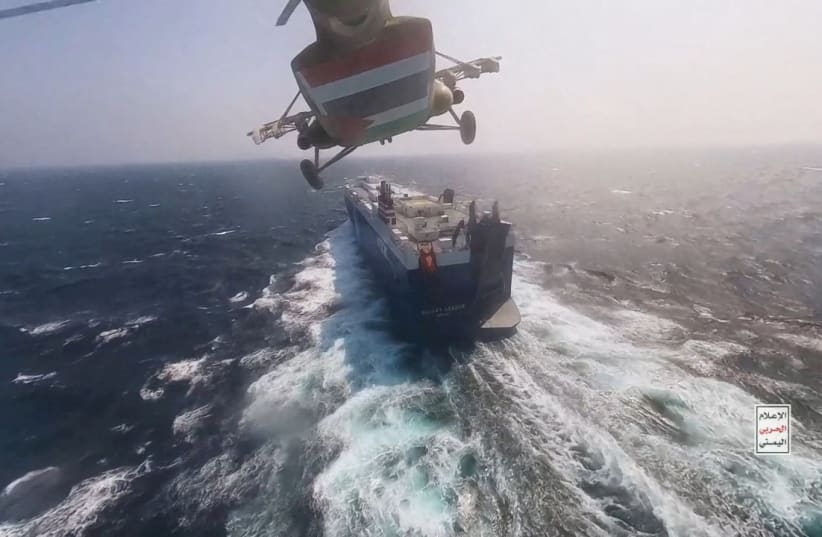
Saudi Arabia has asked the United States to show restraint in responding to attacks by Yemen's Houthis against ships in the Red Sea, two sources familiar with Saudi thinking said, as Riyadh seeks to contain spillover from the Hamas-Israel war.
The Iran-aligned Houthis have waded into the conflict that has spread around the Middle East since war erupted on Oct. 7, attacking vessels in vital shipping lanes and firing drones and missiles at Israel itself.
The group which rules much of Yemen says its attacks are a show of support for the Palestinians and has vowed they will continue until Israel stops its offensive on the Gaza Strip - more than 1,000 miles from their seat of power in Sanaa.
The Houthis are one of several groups in the Iran-aligned "Axis of Resistance" that have been attacking Israeli and US targets since the start of the conflict on Oct. 7, when their Palestinian ally Hamas sparked the war by attacking Israel.
The conflict's regional risks
Their role has added to the conflict's regional risks, threatening sea lanes through which much of the world's oil shipped, and worrying states on the Red Sea as Houthi rockets and drones fly toward Israel.
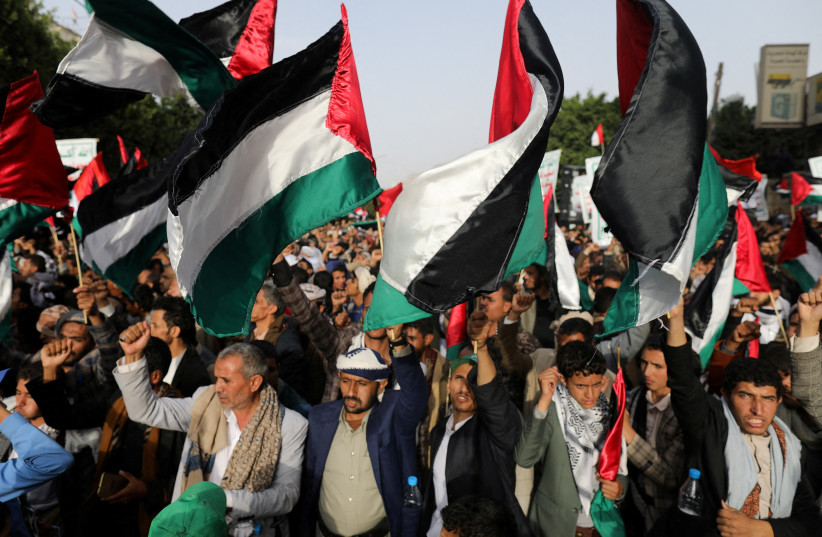
Riyadh, the world's top oil exporter, has watched with alarm as Houthi missiles have been fired over its territory.
With the Houthis stepping up attacks on shipping over the past weeks, two sources familiar with Saudi thinking said Riyadh's message of restraint to Washington aimed to avoid further escalation. Riyadh was so far pleased with the way the United States was handling the situation, the sources added.
"They pressed the Americans about this and why the Gaza conflict should stop," one of the sources said.
The White House declined to comment.
The Saudi government did not respond to an emailed request for a comment on the discussions.
As Saudi Arabia presses for a ceasefire to halt what it has called a "barbaric war" in Gaza, its diplomacy reflects a wider policy aimed at promoting regional stability after years of confrontation with Iran and its allies.
Focused on expanding and diversifying the Saudi economy, Riyadh this year normalized ties with Tehran and is seeking to exit the war it has been waging with the Houthis in Yemen for nearly nine years.
The sources said Saudi Arabia was seeking to advance the Yemen peace process even as war rages in Gaza, worrying it could be derailed. Yemen has enjoyed more than a year of relative calm amid direct peace talks between Saudi and Houthi officials.
The Houthi attacks during the Hamas-Israel war have elevated their profile in the Iran-aligned camp which also includes Hamas, Lebanon's Hezbollah and Iran-backed militias in Iraq.
The Houthis have emerged as a major military force in the Arabian Peninsula, with tens of thousands of fighters and a huge arsenal of ballistic missiles and armed drones.
Senior sources in the Iran-aligned camp told Reuters the Houthi attacks were part of an effort to put pressure on Washington to get Israel to halt the Gaza offensive, a goal that Iran shares with Saudi Arabia and other countries in the region.
One of the sources, who is based in Tehran, said Houthi representatives had discussed their attacks with Iranian officials during a meeting in Tehran in November, agreeing to carry out actions in a "controlled" way that would help force an end to the Gaza war. The source was briefed on the matter.
Another of the sources said Tehran did not seek "all-out war in the region" that would risk drawing it indirectly.
A Houthi spokesperson did not respond to a request for comment. Iran has denied being involved in the attacks. Iranian officials did not respond to a request for comment on the Houthi attacks.
Destroyer downs drones
The United States and Britain have condemned the attacks on shipping, blaming Iran for its role in supporting the Houthis. Tehran says its allies make their decisions independently.
In one of the latest incidents, three commercial vessels came under attack in international waters on Sunday. The Houthis said they had fired at what they said were two Israeli vessels. Israel denied any link to the ships.
A US Navy destroyer, the Carney, shot down three drones as it answered distress calls from the vessels, which the US military said were connected to 14 separate nations.
The Pentagon said on Monday the Carney had taken action as a drone was headed in its direction, but that it could not assess if the warship was the intended target.
Pentagon spokesperson Sabrina Singh stopped short of using language that could suggest any imminent US retaliation against the Houthis. Asked if the United States might retaliate, Singh said: "If we decide to take action against the Houthis, it will of course be at a time and place of our choosing."
An Iranian diplomat said Tehran and Washington had exchanged messages through intermediaries about Houthi attacks since the start of the Hamas-Israel war. The diplomat, who was involved in exchanging the messages, said both called for restraint.
Iran on Tuesday denied any role in attacks or actions against US forces.
Go to the full article >>Israel-Hamas War
- Hamas launched a massive attack on October 7, with thousands of terrorists infiltrating from the Gaza border and taking some 240 hostages into Gaza
- Over 1,200 Israelis and foreign nationals were murdered, including over 350 in the Re'im music festival and hundreds of Israeli civilians across Gaza border communities